#my hero academia meta
Explore tagged Tumblr posts
Text
The potential for envy and jealousy, not just admiration, actually being the root of Toga’s obsession with Ochako makes me insane.
Ochako is a girl who “can’t hide anything” and whose straightforward and blunt style of expressing herself is seen as charming and appealing. She’s cute, has loving (if poor and struggling) parents, has her main childhood fixation (looking at all the happy people heroes help) constantly validated. Her parents supported her dream of becoming a Hero. Her heteronormative crush on Izuku is also validated without her even asking for it (and the messed-up thing is that she doesn’t want it. She doesn’t want people sticking their noses in on that one to tease her.) And even with her crush present, Ochako is still allowed to interact with Izuku and be close with him. He’ll let her watch his back. She can tell him that they’ve inspired each other with things like the addition of wires to her costume. She can reach out and help him when he is in trouble, and it isn’t impeded by her crush nor are her intentions misconstrued because of her crush (excluding whatever the heck the fandom is saying.) Her feelings are big and confusing and contradictory, but nobody fears her for them - and in fact, Tsu is there to sympathize and support her throughout her struggle with them.
Toga is a girl who put on an ironclad tatemae of repression because her outward-facing obsession was seen as bad and horrible, and then when it cracked, her forward behavior towards others was always condemned. She is seen as creepy and, unlike La Brava, as overtly dangerous and someone to be openly reviled. Her parents treated her like shit and didn’t support damn near any of her dreams or desires. None of her interests or fixations are supported or tolerated. Toga is cute and doll-like, but it is seen as creepy. Her attractions towards others are always seen as dangerous. Her fixation on their happiness and love is condemned. Only the League would trust her to stand near them and fixate on them without thinking it was inherently dangerous, and they’re already too messed up to really give her the time and attention she needs or to understand her. Jin died, Magne died, Shigaraki is barely there on the best of days, Spinner doesn’t get it, Mr. Compress keeps his secrets, and this one time Dabi helped her burn down her house??? Everyone else hates the few people who do support her. Her feelings are big and scary and confusing to her and people don’t just pry into them as cute teasing, but for use in life-or-death situations. Toga’s internal turmoil is leveraged as a weapon to try to trap and kill her (Ochako is the rare exception as this is not her goal.)
The difference is that it’s seen as cute and appealing on Ochako and frightening and twisted on Toga. What the fuck. What a double standard.
590 notes
·
View notes
Text
so BNHA world apparently has villain-specific hospitals, which is concerning to me on so many levels. Like:
a) the implication that serious injuries to villains by heroes happen regularly enough to require villain-specific hospitals
b) the fact that this is not a problem anyone appears to be concerned about (as in, no one is talking to heroes about excessive force, even in cases where the villain in question isn’t committing violent crimes)
c) the question of who is staffing these hospitals. hospital-level medical care requires expertise, and given the way BNHA world views villains, I’m not imagining that many medical professionals are lining up to treat the serious injuries that the heroes are inflicting
d) standard of care. who has oversight on the villain hospitals, and who has oversight on them? if the villains were receiving inferior or unethical treatment, would anybody give a shit? would anyone even know?
idk what the point of this was other than that I feel a fic coming on, but yikes.
#bnha#bnha meta#mha#mha meta#my hero academia meta#my hero academia#this post brought to you by me rewatching season 4#and subsequently having an aneurysm#the IMPLICATIONS#anyway#clown hours
62 notes
·
View notes
Text
I don't know about you, but if you look at it, AFO is the evil version of Laios.
Literally, AFO and Laios have the same wish: to become the ultimate monster/demon lord (in short, they wanted to become their OCs). The reason they both have that wish is because it's a power fantasy that allows them to escape the horrible things that happened to them.
Furthermore, Laios and AFO were very intelligent in the environments they were in because in said environments they fit the obsessions of both (Laios knows how to handle the dungeon because of his knowledge and obsession with monsters, AFO had knowledge of the quirks and the hero society because of his obsession with comics and the hero society works as a stereotypical comic world to the point of cataloging people according to the quirks they had, either cataloging them as heroic or villainous).
Also, AFO and Laios love their younger siblings (Yoichi and Falin), AFO and Laios love them so much that they can't stand it when someone hurts them and when they die AFO and Laios are obsessed with bringing them back somehow and they and their younger siblings were victims of discrimination and ostracism.
The difference is that AFO, in his eagerness to make his wish come true, has hurt countless people and wants to force everyone to love him and as punishment he never gets his wish and he fails to recove Yoichi, while Laios did achieve his wish and he does manage to recove his younger sister, but he didn't want to hurt anyone and he even managed to have friends who really love him.
#Interestingly AFO is what Kabru thinks Laios is.#laios touden#afo#all for one#my hero academia meta#my hero acedamia#my hero academia spoilers#dungeon meshi#dungeon meshi meta#dungeon meshi spoilers#mha#mha spoilers#mha meta#bnha#bnha meta#bnha spoilers#boku no hero academia#boku no hero academia spoilers#boku no hero academia meta
20 notes
·
View notes
Text
The Symbol of Peace: An Analysis of Masculinity in My Hero Academia
Izuku Midoriya runs through the city toward the site of a villain attack, excitement on his face as he knows what this means. He elbows his way to the front of the crowd and up to the very front line the heroes set up as they battle their foe, watching in awe and excitement as the heroes he looks up to are locked in battle.
This scene plays out in the beginning of the hit anime series My Hero Academia. Set in a fantastical version of Japan in which heroes are a part of every day society, the series follows the story of Izuku Midoriya, also known as Deku, as he strives to become a great hero using the power passed on to him by Japan’s number one hero, All Might. The first chapter of the manga series was published in Shonen Jump in 2014, and was adapted into an anime in 2016. Both the manga and anime are still in progress, and have a great level of popularity. According to Parrot Analytics, My Hero Academia is “ranked at the 99.9th percentile in the action genre, indicating that it enjoys exceptional demand compared to 99.9% of all action titles in the United States” (My Hero Academia YTV). Due to its outstanding popularity, I believe this is a relevant text to analyze.
From the very beginning scenes of the series, as Midoriya watches this battle unfold, the audience is shown what the image of a hero looks like. They are strong and powerful, with physiques that look like action figures. They are something for the ladies to swoon over. Notably, they are men. It is not until the very end of the fight we see our first female superhero, who is shown as “stealing the spotlight” from the men in her skintight suit, and immediately subject to objectification and sexualization by the media on the sidelines. To those who know comics and superheroes, these types of hegemonic masculine messages are to be expected. While these messages are seen as such a norm that it’s just a part of the superhero genre, there are real impacts to this. In a study conducted by Coyne et al. about the effects of superhero media on kids, research found that “early superhero exposure was indirectly associated with weaker egalitarian attitudes toward women and greater endorsement of the muscular ideal” (Coyne et al. 634). This shows that superheroes have a real impact and are worth studying. This analysis will look at masculinity in the world of My Hero Academia, as shown through the lens of All Might, the Symbol of Peace.
Who is the Symbol of Peace? All Might is one of the top heroes in the version of Japan this story takes place in, and has been for years by the time the series starts. He is rated the number one hero in the in-universe hero popularity polls, and has one of the greatest powers that citizens in that world have ever seen. As such an important cultural figure in this world of heroes, he is the ideal, the standard, the one everyone looks to when they want to see what it means to be a hero, and we know that what it means to be a hero in this world is to be masculine. That is why I have chosen All Might as the subject of this analysis, and to begin I would like to look at Kimmel’s tenants of masculinity. In his documentary Guyland, Kimmel breaks down four basic rules of masculinity: “No sissy stuff”, “be a big wheel”, “be a sturdy oak”, and “give ‘em hell” (Kimmel). Let’s explore what these mean, and how they are evident in the character of All Might.
When Kimmel says “no sissy stuff”, what he means is that there can be no sign of femininity or weakness. In societies where masculinity is seen as the ideal, femininity and weakness have become synonymous with each other when it comes to the measurement of masculinity. This is apparent in All Might’s appearance. He is the perfect picture of the classic superhero, with bulging muscles and a towering, hulking figure. When he speaks his booming voice resonates and shakes you to your core. It is not just his appearance that this is evident in, however. We can see this line of thinking, “no sissy stuff”, in the way All Might acts, especially toward the beginning of the series. In season one episode 3 “Roaring Muscles”, All Might passes on his power, known as a “quirk” in this world, to the protagonist Izuku Midoriya. As he does this, Midoriya’s eyes welled up with tears as the emotions of all of his dreams finally coming true overwhelm him, All Might says “Seriously! You gotta stop crying so much if you want my quirk” (My Hero Academia). This is a common theme, as Midoriya is very outwardly expressive with his emotions while All Might begins their mentorship with a much more hegemonic view of masculinity.
To “be a big wheel” means to have lots of money, power, and status. This is probably the tenet that All Might intentionally goes after the least, but that does not change the fact that he fully embodies it. As the number one hero in Japan he holds a very important status, and the Symbol of Peace is a name anyone in the world of the show knows. In season three episode 49 “One for All”, All Might is fighting against the main antagonist of the show in a large display that is being televised to all of Japan. He has lost the last of his power that allows him to stay in his superpowered form, but he continues to fight on despite this. His mentor urges him to stay strong, saying “No matter what you look like, you’re still everyone’s number-one hero!” This is just one of many illustrations of the status All Might holds in the eyes of the citizens of Japan.
Arguably the most prevalent of the four tenets in All Might’s story is “be a sturdy oak”. All Might specifically created the idea of the Symbol of Peace to be an unwavering force of help to those in need. This is evident even in his catchphrase. We see him use a variation over and over, a common theme throughout the series, going all the way back to his first appearance as a hero: “Fear not, citizens. Hope has arrived. Because I am here” (My Hero Academia season one episode one “Izuku Midoriya: Origin”). When Midoriya is talking about what he looks up to so much about All Might he says “There’s always a smile on his face, no matter how bad things get. Even when things seem impossible, he never gives up” (My Hero Academia season one episode one “Izuku Midoriya: Origin”).
The last of the tenets is “give ‘em hell”. This comes down to a reckless sense of daring, always throwing yourself in no matter the danger and being willing to do things no matter the risk. This is seen as bravery, the opposite of being a “sissy” as mentioned in the first tenet, even at the cost of the person performing these acts. We see this in All Might’s willingness to throw himself into any battle, no matter the cost to himself, and how he sees that as admirable. In his backstory preceding the events of the show, All Might was injured in a battle with All For One that left him only able to use his power for a finite amount of time each day. During the time All Might first meets Midoriya he has reached his limit on his power use for the day when a villain attacks a student. All Might is on the sidelines in his disguised form, watching this go down while cursing himself for not being able to help because of his limit. When he watches a powerless Midoriya rush in to help, All Might says “I have to do something, no matter the cost” before pushing past his limit to use his power. He tells Midoriya “Pros are always risking their lives, that’s the true test of a hero!” (My Hero Academia season one episode two “What It Takes To Be A Hero”). He uses his great power to blow the villain away with a single hit. After things have calmed down from this battle, All Might talks to Midoriya about this and what it means to be a hero. He tells Midoriya “There are stories about every hero, how they became great. Most have one thing in common. Their bodies moved before they had a chance to think” (My Hero Academia season one episode two “What It Takes To Be A Hero). This becomes a recurring line in the show when people talk about what it means to be a hero, and it truly highlights the reckless and daring action described by the tenet “give ‘em hell”.
These are only a handful of examples of how All Might embodies the tenets of masculinity in each and every episode. However, these tenets do not go without cost to All Might. We can see as his adherence to these tenets broaches the realm of toxic masculinity-”a particular version of masculinity that is unhealthy for the men and boys who conform to it, and harmful to those around them” (Flood).
In season four episode 67 “Fighting Fate” All Might tells his protege about that time from his past. His sidekick, a hero named Sir Nighteye with the power to see the future, warned All Might that if he were to keep fighting, he would die a horrible death at the hands of villains. All Might acknowledges this, but he presses forward despite the warnings in an attempt to uphold the Symbol of Peace. He says “For the sake of this world, I have to be able to say that I am still here” (My Hero Academia season four episode sixty-seven “Fighting Fate”). As he tries to uphold the tenets, particularly “be a sturdy oak” here, he only begins to break himself down and harm himself as he exacerbates his injuries and puts himself at risk again and again. This is often rewarded in the show, saying he is a good hero for doing these things.
This line of thinking gets passed down to his protege Midoriya as All Might trains him to become the next Symbol of Peace. Here we can see the effects of gender socialization on the story. As defined by Dipti, “Gender socialization is a process by which individuals develop, refine, and learn to ‘do’ gender through internalizing gender norms and roles as they interact with key agents of socialization” (Dipti 9). All Might passes down his ideas of masculinity, such as in the “no sissy stuff” point when he tells Midoriya he needs to stop crying so much. In season two episode 19 “The Boy Born With Everything”, Midoriya is competing in his school's sports tournament and is nervous for his upcoming battle. In his pep talk, All Might tells Midoriya “Whenever you’re scared or nervous about a fight, just try to deal with it by smiling!”, passing on the ideals of being a “sturdy oak” that never wavers even in the face of fear.
Midoriya internalizes these messages, and it all comes to a big culmination in season six. The main antagonist appears to be on the winning side, the world has fallen to ruins, and Midoriya is working as a vigilante trying to take on the world and save everyone himself. All Might was initially in contact with him during this, until Midoriya runs off leaving All Might behind to fight the main antagonist alone. In doing so, Midoriya embodies the traits of “be a sturdy oak” and “give ‘em hell'' by rushing off without regards to himself to take everything on his own, and makes sure there is no “sissy stuff” as he insists he is fine, shoving down any emotions and refusing to ask for help. These are all traits he learned from All Might, and in season six All Might has the realization that the messages he passed down to Midoriya were toxic. As Midoriya speeds away, too fast for All Might to catch up, All Might cries after him, saying “I get it! I know what a heavy burden this is to carry alone! Which is why I want to scream at you, ‘Don’t work too hard. It’s okay to take a break when you’re tired.’ Young man, I’m sorry” (My Hero Academia season six episode 135 “Friend”). Later that same season, Midoriya is confronted by his classmates and close friends in a stunning display of emotional vulnerability that warrants an analysis of its own beyond the scope of this paper. Toxic masculinity is broken down as the characters show that it is leaning on others and being vulnerable that shows true strength.
The vulnerability in this show was not lost on viewers. One article details the reaction audiences had to this scene on social media as people shared their thoughts and breaking down their own toxic masculinity. The article states “Many users openly expressed how much they sobbed wholeheartedly alongside Deku and the gang during this segment of the storyline, without a worry in the world about how ‘unmanly’ their confession may be perceived” (Chester-Londt). It is clear that audiences hold a place for this type of breakdown of toxic masculinity, even in superhero stories where that is perceived to be the default.
For a long time superhero stories have been a place of traditional, hegemonic masculine ideals, and My Hero Academia is no exception to that. The leading figure in the hero society, the Symbol of Peace, exhibits clear signs of all four tenets of masculinity talked about by Kimmel. He passes on these masculine ideals to his students, as evident through the character of Midoriya, and the strict adherence to these ideals proves to be quite toxic. What makes this series unique for a hero story, however, is the recognition of that toxic masculinity and a changing of messages saying it’s okay to rely on others, ask for help, and not always live up to unattainable ideals. We know from audience reactions that there is a want for these types of stories, and I hope to see more like it in hero media going forward.
Works Cited
Chester-Londt, Levana Jane. “My Hero Academia Is the Cure for Toxic Masculinity.” Game Rant, 1 Apr. 2023, gamerant.com/my-hero-academia-is-the-cure-for-toxic-masculinity/.
Coyne, Sarah, et al. “Making Men of Steel: Superhero Exposure and the Development of Hegemonic Masculinity in Children.” Sex Roles, vol. 86, no. 11/12, June 2022, pp. 634–47. EBSCOhost, https://doi-org.dmacc.idm.oclc.org/10.1007/s11199-022-01293-2.
Dipti. “Gender and Socialization.” International Journal of Recent Research Aspects, vol. 9, no. 2, June 2022, pp. 9–12. EBSCOhost, search.ebscohost.com/login.aspx?direct=true&db=asn&AN=158174861&site=ehost-live&scope=site.
Flood, Michael. “'Toxic Masculinity': What Does It Mean, Where Did It Come from – and Is the Term Useful or Harmful?” The Conversation, 21 Sept. 2022, https://theconversation.com/toxic-masculinity-what-does-it-mean-where-did-it-come-from-and-is-the-term-useful-or-harmful-189298.
Kimmel, Michael S., and Media Education Foundation. Guyland : Where Boys Become Men. Media Education Foundation, 2015, http://www.kanopystreaming.com/node/144408.
My Hero Academia, created by Kohei Horikoshi, Bones, June 2016.
“My Hero Academia (YTV): United States Daily TV Audience Insights for Smarter Content Decisions - Parrot Analytics.” Parrot Analytics, tv.parrotanalytics.com/US/my-hero-academia-ytv. Accessed 24 Apr. 2024.
I hope everyone enjoyed!! I have so much more to say about this topic that I didn’t get to due to the page restraints on the paper. This version already goes over the page limit and still manages to cut out about two thirds of my initial points. So if anyone wants to discuss further with me, please do!!!! I love talking about this stuff!!
And for those who asked to be tagged:
@steh-lar-uh-nuhs
@anna-pre
@0im-kinda-dumb0
@ghostspace37
#my hero academia#mha#boku no hero academia#bnha#analysis#meta#my hero academia meta#mha meta#boku no hero academia meta#bnha meta#deku#midoriya izuku#izuku midoriya#all might#yagi toshinori
37 notes
·
View notes
Text
I've read a lot of meta to understand Izuku and Katsuki's relationship. I never really understood Katsuki's side. But I think I've got it now. I am slow to understand character interactions sometimes (I'm neurodivergent), so please bear with me! I am also open to any corrections! Ok, this is what I understand as canon:
Katsuki thought Izuku was always a better hero (personality wise) than him when they were kids/growing up (ie. Izuku always wanted to help others, even Katsuki). Katsuki was so insecure about this because he wanted to be the best hero. So, he constantly put Izuku down in typical bully fashion.
He was so annoyed, mad, and hurt when he found out Izuku had a quirk when Izuku passed the entrance exam. He felt lied to and betrayed since Izuku always said he was quirkless. This (Izuku getting into UA) was another conformation for Katsuki that Izuku was better than him. Katsuki used to think he was automatically better than Izuku because he had a quirk. Katsuki thought that even though Izuku had a hero's personality and will, he would never surpass Katsuki because he was quirkless. But reality changed once Katsuki found out Izuku did actually have a quirk.
Then, when Katsuki found about All Might, both their childhood hero, passing down OFA to Izuku, Katsuki was heartbroken in another way. His hero (AM) recognized what Katsuki saw all along: Izuku is a hero (and maybe even a better one than Katsuki).
But this whole time, Izuku just admired Katsuki for his persistence and quirk. He thought he was amazing and wanted to be like Katsuki. So he fought tooth and nail to be on Katsuki's level. This was seen as threatening to Katsuki for the reasons above.
So essentially, both think they are inferior to the other and are trying to "catch up." But maybe they've realized neither is better and they're just different? Idk that's all I've got for now.
#bkdk meta#bakudeku meta#bakudeku#mha meta#mha analysis#bnha meta#bnha analysis#bakugo katsuki#katsuki bakugou#izuku midoriya#midoriya izuku#mha#bnha#my hero academia#boku no hero academia#boku no hero academia meta#my hero academia meta#bakugo meta#katsuki meta#izuku meta#midoriya meta
82 notes
·
View notes
Text
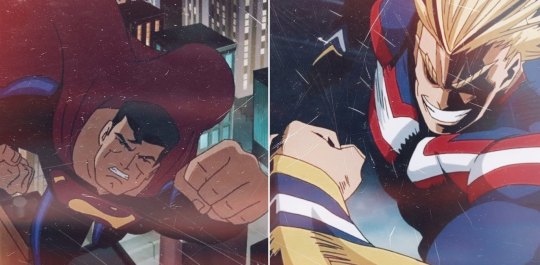
Superman vs. All Might
Hello, this is a post comparing My Hero Academia to the comic books it was inspired by. Despite the title of this post, this is not going to be about the power levels of the individual characters. Rather, a comparison between what kind of heroes Superman, and All Might are respectively, and how All Might compares to the all-American super hero.
1. With Great Power
It's pretty obvious All Might takes his influence from Western / American ideas of superhero comics. He studied in the USA before returning to japan as a part of his training. He wears red, white and blue and shouts the names of American states before his attacks.
Before we begin have you heard about Superman? Really, never? That's kind of unlikely. If you want to read more about him though, there's this post with several recommendations of short comics that help you get the idea of his character. I personally recommend "All Star Superman" which is only twelve issues and is it's own self contained story.
There's also "Superman the Animated Series" which I believed watching just the first few episodes will give you everything you need to know about his character. I also recommend watching the Justice League episodes "Patriot Act", "War World", "Hereafter" and "For the Man Who has Everything" to get a glimpse of his character. I'll be referencing a line from the series finale of Justice League later on in this post, though I don't reccomend watching that because all the above are one shot episodes and the finale has spolers obviously.
So, All Might like Superman the single strongest superhero in his country. The only one of them that could truly be called "Superhuman", to the envy and amazement of others. There's an arc in My Hero Academia Vigilantes, where every single hero struggles only to fail to save a building full of people from collapsing. Only for after an entire arc of more minor heroes completely failing to stop the building from falling down, across the street All Might hears about it and arrives at the last second saving everyone inside and a couple of cats too.
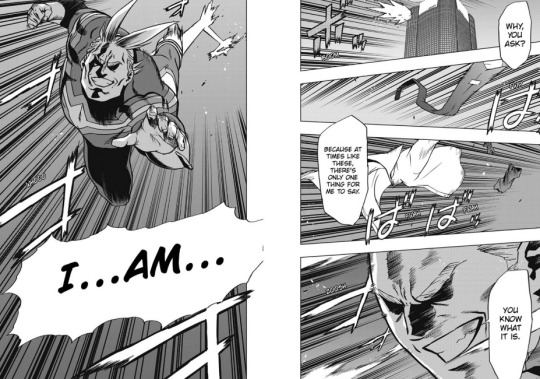
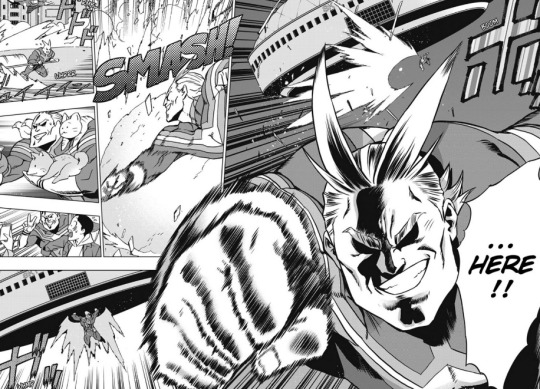
The basic concept of All Might and Superman is basically the same, they are both the respective strongest heroes in their world's, and they are both defined by the fact they use their great power entirely altruistically. They work themselves to the bone saving other people.
In fact, in comparison to Superman All Might overowrks himself so much it can be considered a flaw. It's shown in the overhaul arc that All Might used to have a sidekick who was devoted to him, who quit and left him entirely because he could not stand to see how much All Might was ruining himself to help others.
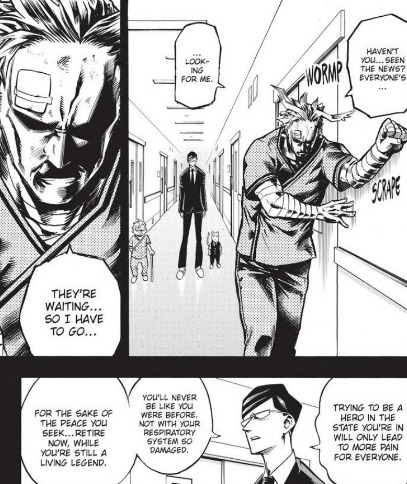
I wouldn't say Superman doesn't work himself to death, or risk his life just as often, because he is a character with a long history, there are times he's been overworked and in crisis, heck he's even died before (Google: The Death of Superman), but working himself to the point of self destruction is not really a character flaw of superman's the way it is for All Might. I wouldn't say it's because Superman is any less selfless than All Might, though.
Rather, it has to do with the underlying difference in their motivation is. Now I said above, they are both people who use their powers to the best of their ability to help the others around them, but that's their actions not the internal motivation that drives those actions.
I've been calling him "Superman" so far, but that's not really his name. Everyone, meet Clark Kent. (This is from Superman: Secret Origin).

Wholesome geek from Smallville Kansas. He was adopted by Ma and Pa Kent, and raised on a farm, with no clue that he was an alien orphan from outer space until about his teenage years when he began all of a sudden to develop superhuman powers. What was his reaction to learning he has those powers? That he's something stronger than any other human?

He didn't want them. Clark Kent didn't want to be different from everyone else, and he never saw himself as better than them. He only comes to term with his identity, when he realize that these abilities are a gift, the same as any other gift, like being a fast runner, or being good at math, and Clark can use these gifts to help others.
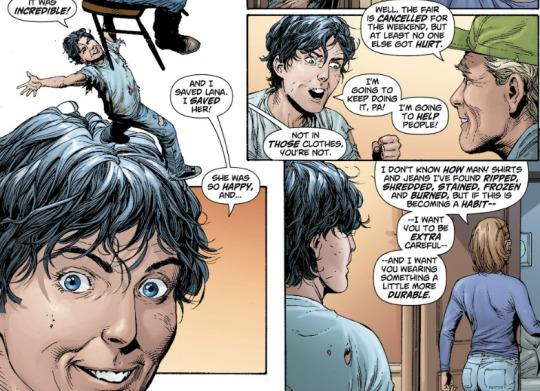
This is essential to understanding Clark's character, he sees himself as gifted yes, but he's never seen himself as superhuman, or better than others. Clark is not superman, Clark is Clark.
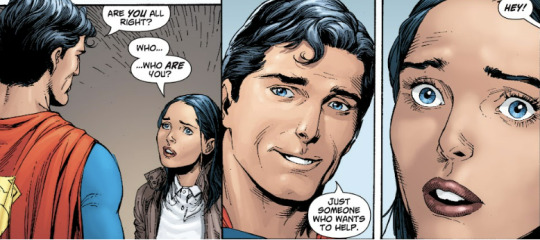
He's a reporter at the Daily Planet who helps the city by writing expose articles with his colleague Lois, and who occasionally hears about disasters and puts on his pajamas to save people from a burning building, or catch Lois when she's flying out of a window. Being superman is community service for Clark. Clark never makes himself out to be a savior.
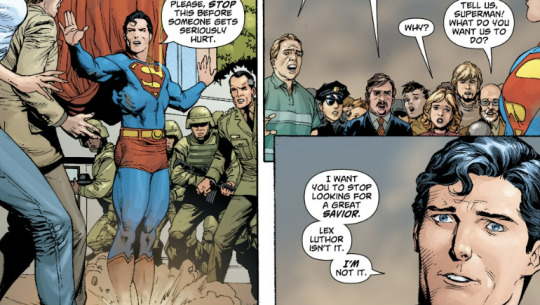

This all comes from Clark's fundamental desire, to be normal, to be a part of the planet that adopted him, and to feel connected to the world. Clark, unlike All Might values both parts of his identity (This is from Superman: Birthright).

There's a lot of things I can tell you about Clark Kent, he's a farm boy, he has a home life, a wife, however I could not tell you anything about Toshinori Yagi, both his past, and what he does when he's not being All Might.
The quirkless Toshinori Yagi may as well have stopped existing the moment he inherited One for All. As for why he has no identity outside of the costume he puts on, and why he devotes everything to being a superhero, it all falls back to that idea of motivation and origin again.
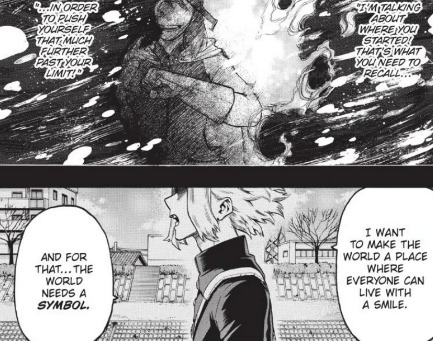
Superman never wanted to be a savior or a symbol, but that's exactly what Toshinori wanted to be, to become what the world needs him to be at the expense of everything including his own identity. Toshinori is not allowed to be human, because he needs to be superhuman. Once again, that makes it seem like Toshinori is more selfless, after all he sacrificed everything. They're both gifted with powers yes, but Toshinori doesn't let himself have anything resembling a normal life because he must be what the world needs him to be.
However, this is where I want to point out, that self-destruction is never a good thing. It's you know, destructive, hence the name. I think one of All Might's greatest flaws is not just that he's "So nice, and so selfless that he always hurts himself helping others", but that he genuinely began to buy the fact that having superhuman powers made him superhuman. He didn't overextend himself just because he was genuinely that selfless, but because he believed HE was the only superhuman with the power to do so and therefore HE had to do it.
We see shades of this in the Dark Deku arc, where this complete selflessness ends up veering into egoism. "I'm the only one in the whole world who could possibly do this, you all are too stupid and slow to catch up."

All Might is known for always flying solo, to the point where he only ever had one sidekick who quit on him because he refused to accept help. Clark cooperates with other heroes all the time, watch literally any episode of the Justice League cartoon.
All Might believes he has to become a superhuman symbol in order to help people, but then he starts to genuinely believe he is superhuman and that's where all the differences between them start to branch out. Superman wants to be a part of the world he wants to be with everyone, All Might wants to stand above everyone as a superhuman symbol. Yes, his motivations are still altruistic, he does it because he wants peace for the general population, but it's still a toxic attitude on his part.
Superman is a character who grapples with his own ability to help everyone too, because someone with his abilities should be able to do just that. (Superman: For all Seasons)
However, unlike All Might who pushes himself further and further away from his own humanity, when Superman reaches his limits, he instead goes back to his humanity instead. Superman's friends and family remind him, he may be strong, but just like anyone else in the world he's not capable of doing anything.

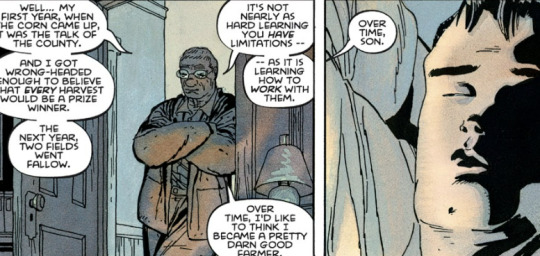
Clark's the kind of guy who when facing a crisis in the big city, comes home to talk with his small town parents, and then is deeply touched and learns a lesson from his father talking about growing corn, because to Clar, his father's efforts at growing corn are the same as him being a hero. They're both just trying to do the best they can do with the skills they have. That is the difference, Clark is rooted in the people around him, and his community, and is basically human in everything but biology.
Toshinori crumples under the expectations of being the perfect symbol that he places for himself, because he has no connection to the world outside being a hero. For Clark, what makes him a hero is the farm boy raising and the good values that his mother and father gave him as a child. For Toshinori, for a long time in the manga at least, he genuinely seems to believe that powers are what make him a hero. (Superman: Brainaac Action Comics #866).

Somewhere down the road, All Might began mistaking power for morality. You know, "All Might Makes Right." This could be partially because All MIght's not entirely based off of superman, Horikoshi has gone on record saying that My Hero Academia is like an exploration of two kinds of heroes, Spiderman and Goku.
Goku being the kind of reassuring hero who always wins a fight. So, All Might himself has two different distinct images, he's someone who's powerful enough to always beat the bad guy, and he's also someone who shows up to save everyone. All Might never really reconciles those two sides of himself though, and because of that he ends up representing a lot of Hero Society's Toxicity.
2. All Might Makes Right
So, I hope the lengths I went to establish "Superman does not think he's superhuman, All Might does, or at least expects himself to be..." have convinced you, because now we're moving onto the more toxic parts of All Might's nature.
All Might set out to do good, yes, but he also inspired a lot of the toxic parts of quirk society, the idea that the only people who can be heroes are people with strong and flashy quirks, the idea that defeating evil is just brutally punching a villain in the face. All of this because, at some point down the line All Might seemed genuinely convinced it was his superhuman powers that made him capable of saving so many that made him the hero.
Hence why we get scenes like All Might whining in front of his All Might Statue that he can't be ahero anymore, because he's too injured to continue fighting on the front lines.
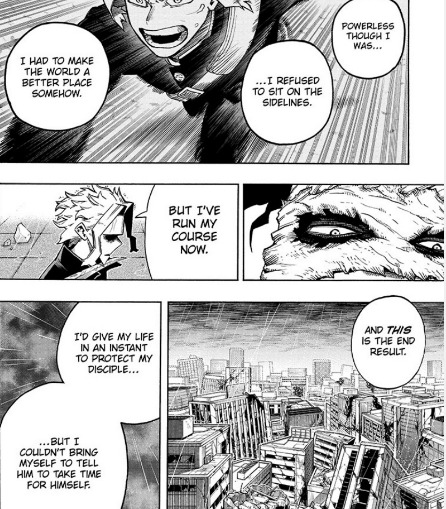


Stain even compares himself to a god, that has now fallen upon the earth and became mortal. Superman was never superhuman or above anyone else, Toshinori can't really cope with being stripped down to having the same powers as everyone else, because he thinks his power lies in showing up to fight the villain.
The one time he's called upon to stop Deku from the same self destructive spiral that he went on, he can't, because All Might hasn't really overcome his own self destructive mentality that being a hero requires him being superhuman.
It's not just self destructive though, All Might clearly believes in the ideal image of a hero that the rest of hero society supports of an overly strong hero, bashing the brains in of a completely evil villain. He never stops to question himself, or the other people who imitate him. To quote League of Legends Arcane of all things, he's so busy worrying about greatness that he doesn't stop to ask himself if his actions are good. Every time we see All Might fight a villain, no matter who it is, it's a complete and absolute beat down.
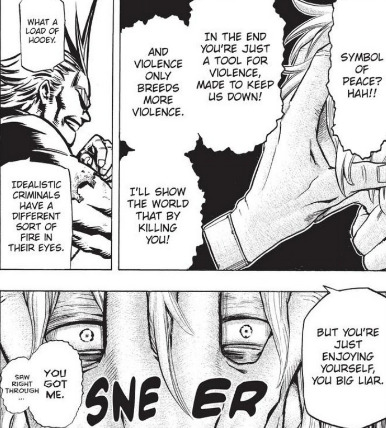
"A hero's always ready to smash his way through trouble, tell me villain do you know the meaning of, plus ultra?"
All Might himself might have brought in AFO alive despite him being the worst villain ever and kept him in prison without executing him, but he's inspired an entire society of top heroes who are in fact, totally cool with brutalizing villains. Heroes who when they hear the only way to fight the Nomus is to kill them, and killing them is completely okay, are actually excited and find it fun.

"Oh wow, we can kill them? Cool, that's way easier!" All Might himself might not kill, but the attitude he promotes that a hero is someone who punches his way through a villain no matter what, promotes this line of thinking.
I could go through the manga and nitpick All Might, like how he never had any reaction to finding out his close personal colleague abused his own family, how he called Dabi the child Endeavor abused a maniac right in front of his brother's face, I bring these up but they're nit picks, I don't think they're in the spirit of the argument. Horikoshi is not trying to say that All Might is cool with child abuse, I'm nitpicking inconsistencies in the writing there. However, the dual nature of All Might's influence on society and the double nature of heroes themselves has been a long running plot thread.
All Might is completely unaware of the toxic influence he has on others, and also refuses to self-evaluate and look at his own flaws because as I stated above he mistakenly believes that All Might needs to be Superhuman in order to be a hero. Therefore, he can't have flaws. All Might seems to believe it's his ability to perform superhuman deeds that makes him a hero, unlike Clark Kent who's greatest ability is his sense of right and wrong.
Clark also, does not support the brutalization of villains in any way. If you want to watch the animated series, there's an episode called "When there's Smoke" where Superman meets a villain who's the victim of government experimentation, and spends most of the episode trying to talk her down, and de-escalate the fight.
Clark: Don't do it volcana. I can help you. Volcana: No thanks. These days I can help mysrlf. Clark: Listen, nobody will blame you for what you've done, but the stealing has to stop, now. Clark: You have to trust me, Volcana. Volcana: DO you know how many times I've heard that? From my parents before they shuffled me off to the institute? From the institute just before they turned me over to the feds. And from the government just before they took away my life.
At the end of the episode, he doesn't even hand her over to the feds or the government because he knows they're going to experiment on her.
Superman usually attempts to de-escalate first, whereas All Might always skips step one. In fact, one of Superman's most legendary animated scenes in the DCAU is a scene where he shows just how much he always holds back in a fight.
youtube
"That man won't quit as long as he can draw breath. None of my teammates will. Me, I've got a different problem. I feel like I live in a world made of cardboard. Always taking constant care not to break something, to break someone, never allowing myself to lose control even for a moment, as someone could... die. Now, you can take it can't you big man? What we have here is a rare opportunity for me to cut loose, and show you just how powerful I really am."
Clark is constantly concerned that if he doesn't hold back perfectly he might hurt someone more than he intended to, even a bad guy, whereas All Might is always going Plus Ultra on those purse snatchers. When Shigaraki brings up the possibility that All Might might be just as violent as the people he fights, he just laughs it off and pounds Shigaraki into the pavement.
Here's another clip where superman disavows violence. Quoted Here:
"Yes, they did see. They saw the ugliness as a solution and it frightens them. It frightened me too when I decided to cross that line and do what you do. It's so easy, anger, vengeance. *Fake punch* Luckily, I'm not you and I never will be." [...] "You think that's it. It's not over you poncey twit. If you think I'll just go to jail and rot you're living in a dream world." "Good, dreams save us. Dreams lift us up and transform us into something better. ANd on my soul, I swear that until my dream of a world where dignity, honor and justice are the reality we all share I'll never stop fighting, ever..."
Clark deliberately holds himself back from violence, because he knows he's a role model other people look up too and he doesn't want them imitating him.
Clark does not think his powers make him a hero, which is why he is so mindful of them. While I don't think All Might is convinced that powers make you a hero, to the lengths that say Endeavor absolutely seeps convinced that being a strong hero, and having strong powers should make him good.... I do want to compare how Clark and All Might act when they're called to save someone in a situation where their powers don't help.
Shigaraki Tomura, the villain of the manga is the grandson of All Might's mentor Shimura Nana. At her request, he never looked for her son after Nana decided to abandon him for his own safety, so they could remain hidden. As a result, when Shimura Tenko lost control of his own quirk and killed his family, no hero came to save him. Not only was All Might unaware of the situation because he was keeping his promise to his old mentor, but in the society that All Might created, Shimura walked the streets for days and not a single person stopped to help him.

Tenko is the child that All Might cold not save. However, upon learning of his existence, that All For One kidnapped the grandchild of his mentor, and then raised him for years into a villain and twisted him as a pawn to use against All Might... learning those circumstances All Might still doesn't try to go after him.

When All Might learns there was someone he did not save, someone he also has a personal connection too because his grandmother abandoned her family in order to raise him up as a hero, his reaction amounts to "Shucks, what can you do?"
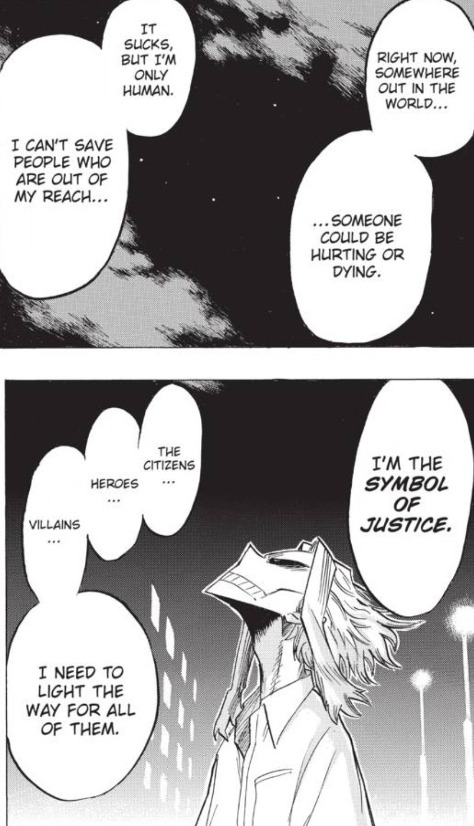
"Shucks, what can you do?"
To compare All Might's dilmena with Tenko, the child he could not / did not save, there is a superman comic called "Superman: Up in the Sky" a six issue self-contained story, about Clark as he attempts to save a single girl who was abducted from earth and taken to space.
It examines the morality of such an action, Clark leaving the earth and going out of his way just for the sake of one person. After all, Clark is the most powerful hero. If Darkseid, or Brainiac shows up, you're going to need Clark fighting on your team.
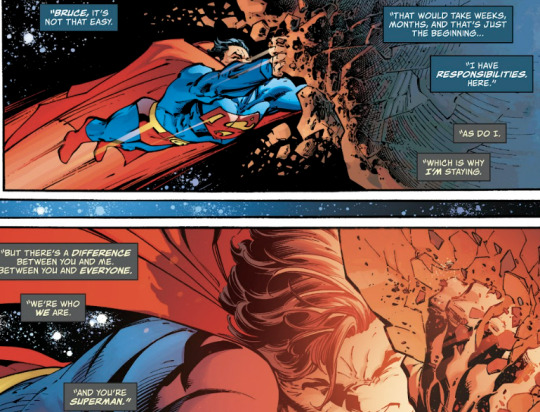
The comci doesn't brush over the fact that Clark leaving just to save one little girl's life means he won't be there to help whatever natural disaster people need saving from, in fact Clark himself said it was a reason he shouldn't go, and Clark during the comic has constant hallucination and fear sequences of someone on earth dying because they needed his help and he was off saving a little girl.
Clark even has the option of leaving the search of the little girl up to the Green Lantern Corps, who are basically the universe's police with magic rings that let them fly practically anywhere and far more members than Clark, but he doesn't.
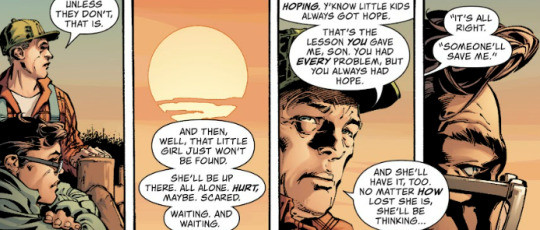
And his reasoning is simple. "No, I can't save everyone but maybe I can save her."
Superman even has a crisis of conscience with the two halves of himself, while hallucinating on an alien planet, the human half of him that wants to save one little girl, and the superhero sdie that's responsible for guarding earth from threats.

The alien himself says he only kidnapped her because she was a nobody, because she's someone who would never come after, because she's not worth that effort.

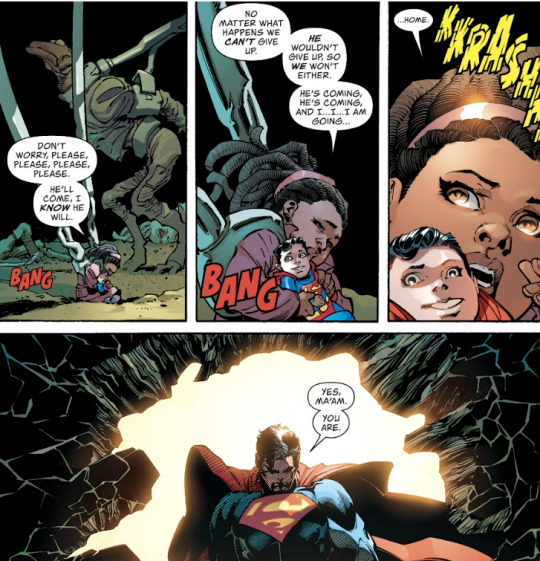
This is the defining scene which makes Superman, Superman. He came to save her, because superman isn't a set of powers, superman isn't a guy who fights bad guys, superman helps people.
Which is why I think All Might is just too different a character from Clark to really be comapred to him in the end, he's too wrapped up in his society's toxic ideals of heroism and too unwilling to bend from it. After all, if All Might had learned something, wouldn't his final stand be doing what Superman did in this comic? Giving everything he had left to save the child he failed to save? Instead, what do we see him do? Go to fight All for One in a giant robot suit.
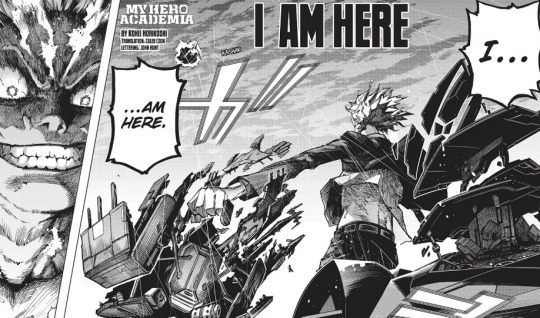
The child who most needs to hear "I am here" is Shigaraki, but All Might's essentially already given up on him. "Shucks, what can you do?" Indeed. I want to point out in this same chapter though, All Might gives a very touching motivating speech to Todorki, reminding him he doesn't have to beat the big bad All for One, and it's okay for him to go after Dabi, and reassure his family and everyone else as a hero. THAT is the hero All Might could be, even without his powers. THAT is the hero who could try to talk to Shigaraki and bring him down, who could make an effort to be there for him now because he wasn't in the past. All Might's genuine altruism, and his moments where he uses his words and idealism to inspire people shows us what he could be, if he just divorced himself from this toxic notion that being a hero means standing up against a bad guy and beating them up.
However, we have not seen him do that yet. Because in the end All Might is no Superman. And he's DEFINITELY no Clark Kent.
#Youtube#my hero academia#mha meta#superman#dc comics meta#dc comics#clark kent#all might#toshinori yagi#my hero academia meta#my hero academia theory#bnha meta#boku no hero academia#superman comics
133 notes
·
View notes
Text
I think there's something really beautiful about how powerful fire quirks are in MHA. Hundreds of years of mutations, billions of different quirks in the world, and yet fire remains a dangerous powerhouse that can overpower almost anything.
Isn't that just the human condition? Fire is warmth and life and growth, but it's also destruction and death and devastation. And the two aren't mutually exclusive. In fact, one use is necessary for the other. You can't have a fire's warmth without destruction of fuel. You can't have life without death.
In that vein, it's poetic that Dabi was born in a wildfire.
Wildfires are devastating for the humans and animals caught in them, but they're also necessary for nature to heal itself, to recirculate nutrients into the soil. A forest comes back stronger and more vibrant after a wildfire. Destruction is a result of the wildfire, but renewal is the ultimate goal. However, a fire that burns too long risks hurting the ecosystem more than it helps it.
There's a delicate balance to a wildfire's rage, but we can't forget it's necessity in our efforts towards self-preservation.
48 notes
·
View notes
Text
I’m sure somebody has written a meta about BNHA and The Ones Who Walk Away From Omelas (and in fact think I have read one). If anybody has it I would love to read it again!
2 notes
·
View notes
Text

Prolific animator Yoshihiko Umakoshi (馬越嘉彦) is best known for his work in shonen anime like My Hero Academia, however he also worked on several episodes of Kunihiko Ikuhara's 2011 Mawaru Penguindrum. During this time, he gave us this Revolutionary Girl Utena piece, itself a bonus purchase privilege poster at Mandarake stores for the purchase of Monthly Anime Style (月刊アニメスタイル) magazine, Vol 5.
It was first published as the full-color feature of the Hardcore of Utena's Supplement booklet in 2013. The Hardcore of Utena is a massive, two volume artbook released at Comiket 84, where you could receive this booklet with the purchase of the larger volumes. Mostly miscellaneous sketch art that features elsewhere, I nevertheless had it scanned already and felt like, hell, let's just finish it and get up there for you! So here are the scans of the 44 page booklet, or if you want the even larger versions, or a download of the lot, I also uploaded it to the Internet Archive! That's gonna be a pattern, y'all. ;)
#revolutionary girl utena#utena#yoshihiko umakoshi#heartcatch precure#my hero academia#utena meta#empty movement#utena archiving#anime archiving#comiket#for real i keep adding things to this site update because it's easier than the miserable process of compiling it all#this is peak adhd in actions folks i've been trying to update the site so long#but every time i sit down to code that#I find some more shit to do rofl#anyways lots is coming including maybe some free shit#idk
528 notes
·
View notes
Text
Even if it is an actual allergy, the fact that this has been a long term issue and he hasn't been given an allergy test to find out what is causing it and remove that speaks volumes.
I have an unknown allergy that causes me issues, but I've only had issues with it in a location I've only gone to twice with my grandma, and after the first time instead of going in I went around town, or stayed in the car.
Tenko lives in this, and it wouldn't surprise me if Kotaro was delaying making a doctor's appointment after all he's made it clear he doesn't care about his son's basic needs for safety the second it's inconvenient
Tenko Shimura's ‘allergies’ and the implications thereof
I think most people always agreed that Tenko's allergies were - in some form or another - emotion-based. Back in 235 we get the infamous "it only itches at home line" line.

It's also emphasized again later in the chapter when we see that the itching gets progressively worse after Kotaro yells at Tenko (meaning that it gets worse when Tenko is sad and/or in distress).

Back in the day, I saw a lot of people theorizing that the itch was a sign of Decay and that it was the early stages of the quirk manifesting within Tenko. But given what we know now, about AFO giving Tenko the quirk and especially when he gave Tenko the quirk, I don't think that this is the case.
We can pretty much pinpoint exactly when AFO gave Tenko the Decay quirk.


These two panels are from 235 and 419 - and I firmly believe that these panels take place only minutes apart from each other. This is also clearly the moment that AFO gave Decay over to Tenko, as shown by the small glow of his hand. Before this point Tenko Shimura was quirkless.

Tenko got his original quirk stolen from him when he was just a baby - meaning that during the time between being an infant and being 5-years-old, Tenko was officially quirkless. This makes a huge difference if we then look back at his allergies and why they appear.

This panel is from just before AFO takes Tenko's hand and gives him the Decay quirk. Look at his face. This boy already has irritated skin around his eyes (it looks like he's just been scratching at it too). With the knowledge that Tenko at this point in time still is quirkless, I think it's fair to say that the allergies are not an early symptom of Decay. It only itches at home. Because the itching is purely psychosomatic. Because it's a stress-response/anxiety-response to the environment this young boy is forced to come home to every single day.

This boy is 5. He's 5. It's not normal for a 5-year-old to think thoughts anywhere near "does my father hate me?"
Kotaro has already put a fear in this little boy, which doesn't stop or go away as soon as he's punishment does. The trauma in this boy is already so big that he thinks about these things in the moments when his dad isn't even actively scolding or punishing him.

It doesn't take a destructive quirk to cause a physical response like itching. All it takes is being constantly afraid of when you're going to be yelled at next, when you're going to be punished next, all by the hands of the parental figure you aren't sure even loves you at all.
It only itches at home. Especially when the four walls of your house are a prison.
#bnha#mha#shigaraki tomura#my hero academia meta#my hero academia#boku no hero acedamia#boku no hero academia
817 notes
·
View notes
Text
I've been thinking about Good vs Bad and how it is portrayed in the media I consume. I'm noticing the binary-ness of Good vs Bad in each story is different.
I will be talking about Death Note, Jujutsu Kaisen, and My Hero Academia. There are anime and manga spoilers. So, if you are not up to date with either, do not continue reading.
In Death Note, there is a pretty clear picture of Good vs Bad. Sure, we see the cliche of "the road to hell is paved with good intentions" through Light's character arc. But even though he started out with Good intentions (punish people who commit crimes), it clearly portrayed that he crosses the line after murdering people whose only crime was wanting to catch Kira. It becomes clear that Light slowly descends into Bad. And Bad has a clear definition: killing innocent people. And in the show as a whole, there are The Good Guys (L and the police) fighting against The Bad Guys (Kira). Viewers see the binary of Good vs Bad pretty clearly.
In Jujutsu Kaisen, I think the lines are more blurred but not totally unrecognizable. We see how Geto started out Good (ie. protect non-sorcerers) yet his morals slowly chipped away at him by the injustices of the jujutsu world. He became fed up with protecting non-sorcerers who never knew or appreciated the sacrifice he and his fellow jujutsu sorcerers made for them. Geto turned Bad even though he started out Good. (This doesn't mean continuing to love someone who is Bad is Bad too. Gojo still cared for and loved Geto through his defection and descent into Badness. But that is a post for another time.)
I mention Geto first instead of Yuji here when talking about JJK because most of the narrative revolves around the fact that Geto and Gojo were so close and Kenjaku could use Geto's body to enact his plan in Shibuya. Geto and Gojo are central to JJK. There isn't much story to tell if we leave those two out.
But if we return to our MC here, I think we still see a clear definition of Good vs Bad through Yuji even though his original worldview was less clear. At first, Yuji believes that he must save people equally--that everyone, no matter if Good or Bad, should receive a proper death. But slowly, he changes his mind. (If I recall correctly, I believe Megumi's opposing belief of saving people unequally as well as Nanami's wisdom influences Yuji's mindset change, but I can't remember exactly. What I'm trying to say is not dependent on what caused Yuji's mindset change though.) Yuji learns more nuance in his original worldview. He realizes he must choose between which people to save. I see this as creating a more binary idea of Good vs Bad because if you're going to save unequally, you're prioritizing some people over others. You must mentally label people as Worth Saving (Good) vs Not Worth Saving (less Good, and potentially therefore Bad).
Plus, the curses/curse users like Sukuna and Kenjaku are presented as fully Bad. We have not, at this time, seen any backstory as to why these curses/curse users became Bad. Therefore, we have no context and no reason to believe they toe the line at all. So, that's why I think JJK has a fairly clear Good vs Bad Guys trope (even if the lines were slightly blurred with Geto).
But in My Hero Academia, the lines are very much blurred. The villains are Bad because of their traumas. We are given reasons as to why Shigaraki, Touya, Toga, Spinner, etc. act the way they do. We are shown that the Bad Guys are that way because Bad was done to them. And I do think Horikoshi is not trying to give excuses, just explanations. Regardless, this poses the questions: who even is Bad? who even is Good?
Deku fights to save everyone, regardless of their Good or Bad label (just like Yuji's original mindset). This is clear as Deku plans on saving Shiggy even though people around him do not share his goal. So, even though this MHA universe has Good vs Bad (ie. Heroes vs Villains), we are presented with ways that question this worldview through our MC's perspective. Deku, I would venture to say, has a foggy definition of Good vs Bad. Therefore, MHA as a manga/anime has a foggy definition of these concepts too.
Alright, that's all I've got for now. I find it interesting which worldview each mangaka takes on to portray in their story. I'd love to hear any ideas in the comments about what anyone else thinks. Please just be nice about it! Thanks!
#jjk#jujutsu kaisen#jjk meta#jujutsu kaisen meta#jjk spoilers#jjk manga spoilers#jjk anime spoilers#death note#death note meta#death note spoilers#jujutsu kaisen spoilers#my hero academia#my hero academia meta#mha meta#boku no hero academia#boku no hero academia meta#mha spoilers#mha manga spoilers#mha anime spoilers#bnha spoilers#bnha meta#meta#anime meta#manga meta#ethics in anime
13 notes
·
View notes
Text
You know, I think this ending would have been slightly less of a fucking disappointment if the heroes hadn't been so unfairly favored by Horikoshi compared to the villains. I mean, seriously
Deku destroys every bone in his body multiple times throughout the story and is warned that if he continues, he'll permanently lose the use of his limbs ? Everything's fine, his body's just got used to being reduced to a bloody pulp somehow so there's no consequences for him. In fact even when he literally loses his arms to Shigaraki, he gets them back two minutes later thanks to Eri because guess what ? Her horn still works even when cut off from her body. How convenient.
Gran Torino gets his ribcage obliterated by Shigaraki ? Don't worry guys, he'll survive that despite his old age and injuries, and this to have no particular role in the plot afterwards.
Bakugo dies heroically trying to buy time before Deku arrives ? Lmao, did you really believe it ?? No of course not, Edgeshot just uses his last-minute Deus Ex Machina to save his life at the cost of his own and- Oops nope he's fine too, my bad !
Hawks murders a criminal fleeing for his life in cold-blood ? The best Hori has to offer is him completely free and in charge of the HSPC.
And no, losing his quirk isn't a real consequence for him because not only it literally played a major part in saving the world with Vestige!Hawks raising an insurrection among AFO's quirks, but also because his quirk has always been the element through which people exploited him.
Endeavor abused his family for years and completely destroyed his eldest son ? No jail time and no media backlash for that, the only blame he received was due to the heroes' failure to stop the League during the Raid Arc.
And don't even get me started on this bs about facing hell or whatever for what he's done : He's literally free and wealthy ; he has Rei, Fuyumi, Shoto, his sidekicks and Hawks on his side ; and all the difficulties he's apparently going to suffer are off-screened.
Deku had to sacrifice OFA and his future hero career to save the world ? Guess what, Bakugo invested all his time and money to make him an Iron-Man suit and now he can still be a hero with everyone else.
There are plenty more examples of this but I think you get the idea. Now let's take a look at the villains' ending :
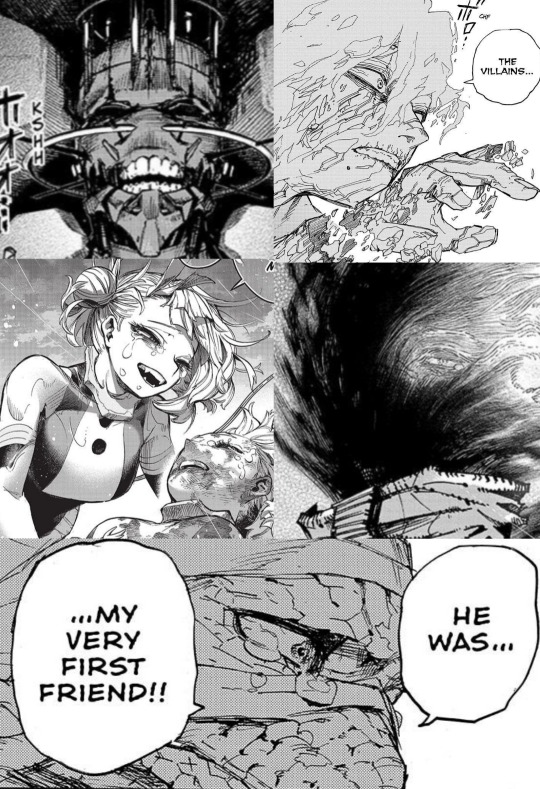
Toya is now a piece of charcoal kept artificially alive for the few years he has left, unable to move a finger, and whose few minutes a day during which he can stay awake will be spent talking to his father who abused him as a child.
Toga, a literal teenager, killed herself to save Ochako and because she knew it's still better than rotting at Tartarus her whole life.
And not only did she die but she did by bleding to death. Let me repeat for those who have trouble grasping what I've just said : In a manga where the heroes can survive having their heart blown to bits, being impaled Kakyoin-style or smashed against buildings like a fly on a windshield, one of the main antagonists died of a fucking hemorrhage…
As for Shigaraki, after learning that his very birth and all the tragedies of his life have been orchestrated by AFO, after all this development and narrative promises about him being saved in the end... Deku just kills him.
Because despite all his speeches about saving him, it seems like the best our MC could do was beating him both physically and mentally until he crumbles to dust…
Compress on his side is apparently locked up for life and kept alive by machines too.
A begging Kurogiri tried in a desperate attempt to save Shigaraki, only to be unceremoniously blown up by Bakugo and dying off-screen without anyone giving a shit, including Aizawa and Mic.
And Spinner will now spend the rest of his life struggling with the extra quirks inside him that affect his body and mind, while having to cope with the thought that his boyfriend best friend and companions have either died alone or are locked away for life in horrifying circumstances.
Clearly not the same as with the heroes...
Now don't get me wrong, even if they suffered just as much from the consequences of their actions or the plot as the League, this ending would still be a disaster in terms of writing but AT LEAST it wouldn't reek that much of hypocrisy.
#bnha spoilers#bnha 430#bnha#mha 430#bnha epilogue#endeavor#enji todoroki#izuku midoriya#tomura shigaraki#jin bubaigawara#toga himiko#shuichi iguchi#kurogiri#dabi#touya todoroki#hawks#takami keigo#league of villains#bnha meta#my hero academia
1K notes
·
View notes
Text
i don't like the growing opinion that people are being 'too hard' on deku for his failing to save shigaraki.
i've seen quite a few people complaining that a lot of the bnha-critical crowd are being too mean to deku for getting tomura killed, arguing that it isn't really his fault, and that hes a 16 year old child soldier who's been failed by almost every adult in his life, why should we be putting all of this on his shoulders? hes just a kid after all?
and the truth is, they're right. deku IS a 16 year old boy whos had the fate of the world thrust on his shoulders. but the story itself just plainly refuses to acknowledge this.
the narrative doesn't acknowledge how fucked up having a school that trains literal children how to be combo cop-celebrities is. it only tentatively acknowledges the fact that a universe having combo cop-celebrities is fucked up, and even then the only people who ever point this out are antagonists, who are portrayed and treated in-universe as untrustworthy. the narrative doesn't care how fucked up dekus circumstances are. the narrative treats deku like hes a fucking messiah here to touch the hearts of the evil depressed villains with his magical empathetic heart of gold before they get blown up or just sent to fucking superhell for daring to challenge the status quote.
deku isn't a person. he's barely even a fucking character at this point. he's a plot device, and a mouth piece for the objectively shitty themes bnha is trying to spout. the themes that tell you that if you're mistreated by society and want to do something about it, you're a villain. that disrupting the status quote and refusing to repent to some random teenage boy spouting empty platitudes at you means you deserve to get sent to fucking superhell. the themes that portray people fighting for civil change as mass murdering supervillains. the themes that look the audience dead in the eye and can call deku the greatest hero to ever live.
deku, who barely spared a second thought to lady nagant telling him the truth about the hero commission. who spouts meaningless platitudes about heroism and morality at nagant, and aoyama, and toga and shigaraki, when even the thought that he should question the world around him comes up. who's constantly talked about as this truly kind, empathetic person, but hasn't spared an empathetic thought to literally anyone who is classified as a villain. who listened to every authority figure around him except the ones who asked him to question his worldview. who saw la bravas tears, shigarakis various breakdowns, himikos plead for understanding, chisakis catatonic state, lady nagants truth, and barley batted a fucking eye. deku, who killed tomura shigaraki.
people don't criticize deku for failing shigaraki because they just hate deku. people criticize deku because of what he represents. because hes a mouthpiece for the atrocious morals and themes of this ideologically rotten manga. because any character he had was chopped up to bits in favor of the incomplete husk we have now. people criticize deku because hes the main character of my hero academia. theres nothing more damning then that.
#my post#bnha#bnha critical#izuku midoriya#midoriya izuku#sorry if this sounds really angry. i mean i am very angry at bnha for being such a nothing burger of empty platitudes and wasted potential#but like. that was extremely predictable#bnha wanted to be more than it was willing to put effort into being and so now its just. worthless#so this is just kinda a vent on all my angry feelings abt dekus failure as a character and a protagonist#tomura shigaraki#my hero academia#boku no hero academia#mha critical#my hero acedamia critical#boku no hero acedamia critical#deku#bnha meta#i mean techinally#mha#mha meta#bnha manga spoilers#bnha manga#long post#well longish
1K notes
·
View notes
Text
This is both hilarious and depressing

screaming
#this is canon.#my hero academia meta#boku no hero acedamia#hero society#boku no hero academia#my hero academia#my hero acedamia#mha deku#bnha deku
324 notes
·
View notes
Text
can we also talk about toshinori crushing the "the end" card with his hand?
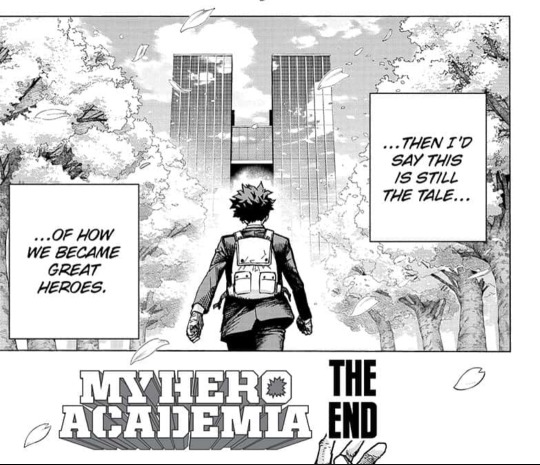

this man was gonna make sure his boy became a hero no matter what. like i'm fully aware this was probably just a humorous way to show us that this was not the end of deku's story, but to me it's symbolic of how the all might we meet at the start of the manga and this all might are not the same.
at the start of it all, he tells izuku he cannot be a hero without a quirk. but now he's the one quite literally breaking his way through deku's acceptance of his "fate" of not being a hero to tell him that he CAN be a hero. he's the one to hand him the tools to become a hero without a quirk (with bakugo, the one who always told him he'd never be a hero, being the one who spearheaded the efforts to get them made).
he crushed his dreams of being a quirkless hero once, and now he's crushing the idea that he CAN'T be a quirkless hero.
#dadmight#mha meta#my hero academia#mha spoilers#mha 430#bnha spoilers#bnha 430#boku no hero academia#all might#izuku midoriya
575 notes
·
View notes
Text
A Reminder about MHA’s last chapter
Dear MHA fandom, the leaks never said that Class-A lose complete contact with Izuku for the last 6 years, only that they haven’t been able to see eachother because of scheduling conflicts. TEXTING, CALLING, AND VIDEO-CHATTING ARE STILL A THING. FOR ALL WE KNOW THEY’VE BEEN TEXTING 24/7 SO PLEASE STOP REACHING SUCH AN INSANE CONCLUSION WHEN THATS LITERALLY NOT THE CASE.
Translations say they “haven’t had enough time to get together”, which means seeing each other in person. It doesn’t mean anything about other forms of communications. Long-distance relationships happen all the time. Dont you remember still keeping in touch with others after moving away or after highschool/college? It’s the same case here.
So, let’s all take a deep breath, no matter who you ship or care about most, and remember that these kids all care about eachother and nothing can change that.
#bnha deku#bnha#midoriya izuku#bnha spoilers#izuku midoriya#my hero academia#boku no hero academia#mha#bnha meta#bnha analysis#deku#bnha manga spoilers#bnha 430#mha 430#bnha 430 spoilers#class 1a#bnha class 1a#mha class 1a#bakugo katsuki#bakugou katsuki#urakara ochako#ochako urakara#shoto todoroki#shouto todoroki#tenya iida#iida tenya#kirishima eijirou#eijirou kirishima#Deku#izuocha
769 notes
·
View notes